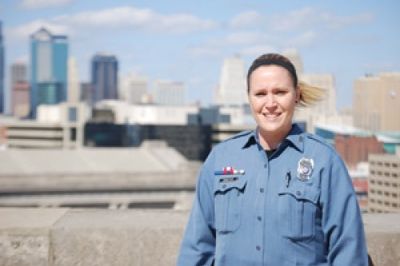The word diversity is often used by organizations to reflect racial, ethnic or gender differences. In recent years, many groups have added sexual orientation to their definition of diversity, whether that be in hiring, employee resource groups, or job protection. The Kansas City Police Department, under the direction of Chief Darryl Forte, has made significant efforts to include the LGBT community in their definition of diversity, including the appointment of Officer Rebecca Caster, an open lesbian, to be the LGBT liaison on the police force.
Caster reports to Capt. Dan Haley, diversity commander for the Kansas City Police Department, whom I first met at the Mid America Gay & Lesbian Chamber of Commerce's inaugural Business Equality Conference in November. Haley has been out there introducing himself to those in the LGBT community since he took the role last year.
He said the diversity office may also help in expanding the diversity of LGBT officers and employees in the KCPD.
"Hopefully, with this initiative, the LGBT community will view the Police Department as being more gay-friendly in terms of reaching out to and working with the LGBT community," Haley said. "When an effort is made to embrace people that have been judiciously left out, whether by design or not," he said, the usual effect is that the department gains high-quality people to become part of its organization.
He said that since the repeal of "Don�t Ask, Don't Tell" in the military, there have been more efforts to make the atmosphere more conducive to coming out. "I know that in the Police Department, we have LGBT officers, but a lot of times it's not known just because, as I understand it, it's easier to not bring it up. You hide it."
"Rebecca being the liaison, hopefully, what I will expect, is that she will bring these opportunities to the organization and then we will send officers, not just her... It is incumbent on the organization to embrace the LGBT community, not just one person."
Although Caster's position is new, she is not new to the KCPD.
"I came on the Police Department 11 years ago and worked patrol in the metro for about seven years," she said, "and then I went to a specialized unit called the Police Athletic League, and they work with inner-city youth trying to get them involved in sports and different programs like that instead of running the streets. And then I left there and I went up to the Shoal Creek patrol division. And I still work patrol, but this is like an added position."
Caster, 33, lives with her partner of more than two years, Briana, and their two dogs. She said that her desire to work in the Police Department was motivated by her desire to serve a city she loves.
"I decided that I was going to be in the Police Department,"she said. "When I think about being a police officer, I want to work for Kansas City. It's where I was born and raised. That's what matters to me. When I have a bad day, if someone tried to hurt me, spit on me, tried to shoot me, I get to come home and be with my family and I don't even have to say anything. It's just a matter of being able to walk in that house and be in a safe environment."
Caster said the need for an LGBT liaison had been expressed before in the Kansas City LGBT community. The Kansas City Anti-Violence Project, for example, requested it several years ago, under a different police chief, she said.
"I'm not really sure why it didn't happen," she said, "but I do know that under our current chief, Forte, that he is behind it 100 percent."
Caster said the awareness of the LGBT community in the KCPD has been improving under Forte's leadership. He was promoted to the job in 2011.
"This is the first year that we've had any training at our in-service, which is our annual training, [about> dealing with issues in the LGBT community. So we'
